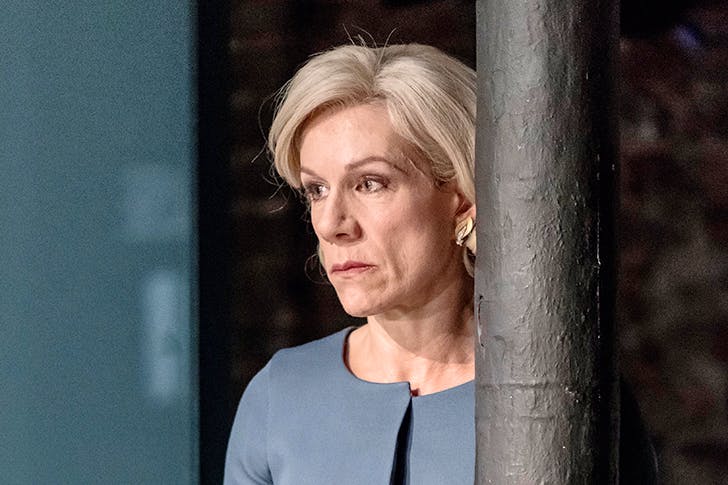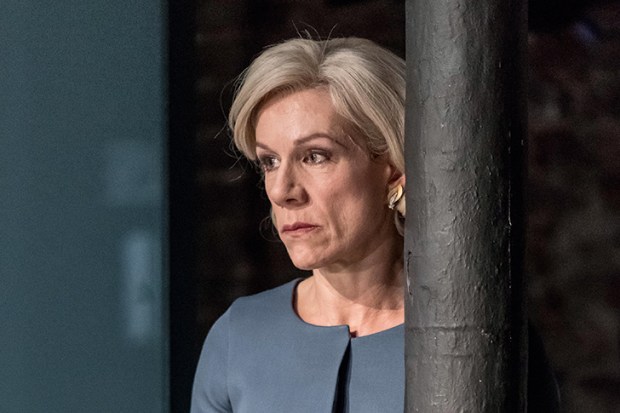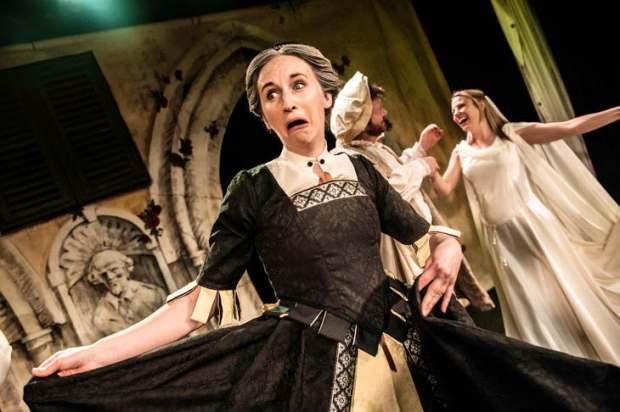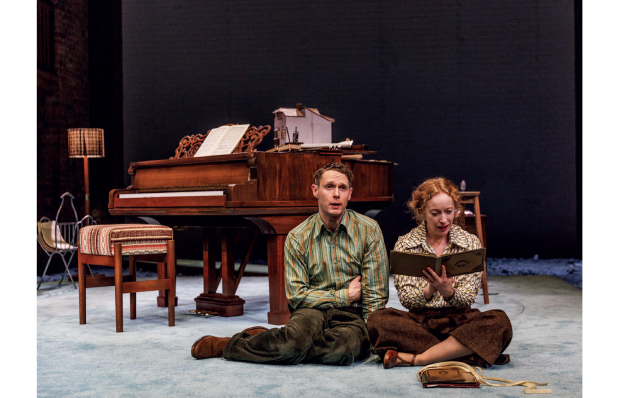Hamlet was probably written sometime between 1599 and 1602. The Almeida’s new version opens with a couple of security guards watching surveillance footage taken in a corridor. Well, of course it does. Nothing says ‘late medieval Denmark’ like closed-circuit television. Hamlet (Andrew Scott) appears. His black shirt and matching trousers suggest a snooker pro at the Crucible or a steward on a Virgin train. Scott is known as a ‘character actor’ (code for ‘baddie’) rather than a leading man. His petulant, squelched-up face and his Ronnie Corbett physique make him perfect casting for Third Crackhead in a squat melodrama but he hasn’t a chance of capturing Hamlet’s lordly despair, his scathing humour, his meditative isolation, his rebellious grandeur, his personal affability, and so on. Scott gives it everything he’s got, which isn’t much. Gruff, sarky, cynical, bad-tempered, ever prone to the full-on hissy fit, he stomps around in his waiter’s costume bawling out the text as if he were an angry nun or a fed-up driving instructor about to retrain as a cage fighter. He does the soliloquys like a signing exercise for the deaf. Up goes a finger to indicate heaven, down goes a finger to indicate hell. When balancing an antithesis he spreads one arm wide, and then the other. To suggest faltering courage he wiggles his hands next to his ears. For passion he punches his breastbone. For determination he pumps his fists. He seems to be posing for a series of woodcuts entitled ‘Rhetorical Attitudes’. Too often his delivery spills into the falsetto range that makes for painful listening.
Blame the director, Robert Icke, who likes his actors to lose control of their voices, even if their seagull honking becomes unintelligible, because he seems to equate high emotion with high volume. Claudius (Angus Wright) is portrayed as a bloodless technocrat. Juliet Stevenson plays Gertrude as a nympho with a bus pass. They’re always snogging, like naughty virgins in the playground, which is embarrassing at first, then tedious, finally irrelevant. The company simply can’t rise to Shakespeare’s level. And the production can barely reach Alan Ayckbourn’s. Elsinore is presented as a sort of Travelodge with sliding glass doors, swivel chairs and squishy round-the-corner sofa units.
The textual omissions and misreadings could fill a small book. Some examples. Shakespeare wrote the temptation scene (‘now might I do it, pat’) as a pair of monologues for Claudius and the prince, but here it’s done as a two-handed conversation. Jessica Brown Findlay has been encouraged to play Ophelia’s tragic farewell (‘goodnight, sweet ladies’) without tenderness or true sentiment, as if she were Diana Ross firing her PR team. The short scene with Osric fails because no one seems to realise that Osric is an overeducated show-off, and the facetious aside intended for Horatio (‘What imports the nomination of this gentleman?’) is delivered, incorrectly, to
Osric himself.
These are pretty basic misunderstandings of a script which, I have to say, is fairly well known in theatre circles. Icke finishes on a happy note with all the dead people getting up off the lino and dancing together in the Travelodge bar. Which is lovely. It lasts four hours.
Ugly Lies the Bone studies the human aftermath of Bush’s botched invasions. Kate Fleetwood plays Jess, an American servicewoman severely injured in Iraq. Half her body has been blown to bits, she walks with extreme difficulty, she can barely raise her right hand, and she wears a headscarf to hide her hairless scalp. Once she was a happy, confident graduate with a bright future and a handsome boyfriend. Now she’s human landfill but she has the spirit of a survivor.
The play starts out as a triumph-over-adversity weepie but its complications are unpredictable and intriguing. Jess’s geeky ex-boyfriend (Ralf Little, exquisitely charming and awkward) is still half in love with her but can’t express his confused adoration. Her sister Kacie reveals flashes of astonishing bitterness over her sister’s fate. And Kacie’s sponger boyfriend, a dimwit with a fake disability, turns out to be far nobler than he seems.
This is a marvellous and often very moving drama, which properly belongs in an intimate black-box theatre. Director Indhu Rubasingham has added complex lighting and sound effects to help her production fill the massive Lyttelton. Just occasionally, they feel like padding. Kate Fleetwood puts in a thrilling display as Jess. Is there a more versatile actress alive? How she suggests the raw horror of physical pain is sensational. How she suggests the determination to defeat that pain is miraculous.
In a short and unobtrusive scene she strips away her sexless outer layers, while singing obsessively to silence her screaming nerves, and she dons her sister’s blue dress and completes a twirl to recapture her lost femininity. The scene lasts a few minutes. Its emotional imprint feels permanent.
Got something to add? Join the discussion and comment below.
Get 10 issues for just $10
Subscribe to The Spectator Australia today for the next 10 magazine issues, plus full online access, for just $10.














Comments
Don't miss out
Join the conversation with other Spectator Australia readers. Subscribe to leave a comment.
SUBSCRIBEAlready a subscriber? Log in